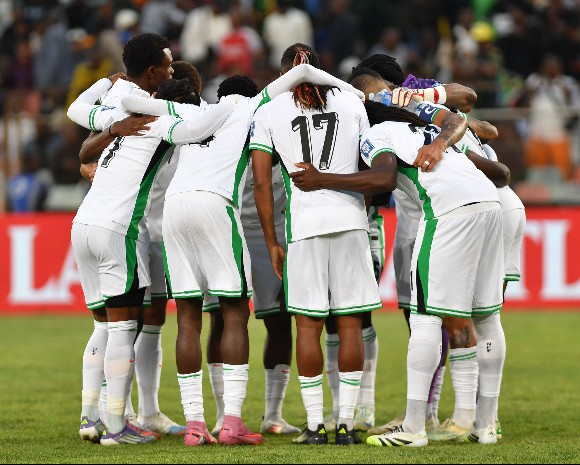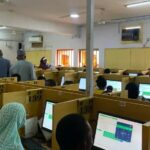Nigeria’s 2026 World Cup qualification path has been unveiled after the men’s national team, the Super Eagles, narrowly missed out on automatic placement.
Pan-Atlantic Kompass reports that Nigeria’s 2026 World Cup qualification path is now set as the Super Eagles will face Gabon in the World Cup play-offs.
The development came after the Super Eagles failed to top Group C, finishing second with 17 points, just shy of South Africa’s 18 points.
This means Nigeria will have to face a stringent two-stage process to secure the 2026 World Cup qualification.
Nigeria’s 2026 World Cup qualification path will see the team battle and conquer the Confederation of African Football (CAF) mini-tournament, and then survive the global Inter-Confederation Playoff (IC Playoff).
This two-step route is the last remaining avenue for Nigeria to secure one of the final slots at the expanded 48-team FIFA World Cup in Canada, Mexico, and the United States in 2026.
How the CAF Playoff Will Be Played
After the Super Eagles delivered a commanding 4–0 victory against the Benin Republic on Tuesday, the team emerged as one of the four best runners-up in Africa.
The massive win was essential, as it provided the vital goal difference needed to confirm Nigeria as one of the four best runners-up from the nine African qualifying groups.
Nigeria finished the group phase with a goal difference of +7, just edging out other contenders like Burkina Faso, who finished with +6, securing the playoff berth.
Pan-Atlantic Kompass reports that the criteria employed by CAF to determine the four best runners-up were technical.
To ensure fairness across all groups, particularly Group E, which had an uneven number of matches following Eritrea’s withdrawal, CAF’s ranking system required discounting points earned against the bottom-placed team in each group before determining the final ranking.
This metric confirmed the final four participants: Nigeria, Cameroon, DR Congo, and Gabon.
In this mini-tournament, Nigeria’s 2026 World Cup qualification path will see them battle with Cameroon, DR Congo, and Gabon to secure just one spot.
Nigeria will face Gabon while Cameroon will face DR Congo.
The match will be hosted in Morocco, spanning four days: the semi-finals are scheduled for November 13, 2025, and the final three days later on November 16, 2025.
The matchups were determined solely by the FIFA Men’s World Ranking released after the October international window. As the highest-ranked side among the four runners-up, Nigeria (1st seed) was drawn against the lowest-ranked side, Gabon (4th seed).
The other semi-final features Cameroon (2nd seed) versus the Democratic Republic of Congo (3rd seed).
All fixtures are single-leg knockout matches. If the scores are level after 90 minutes, 30 minutes of extra time will be played, where each team is permitted to use a sixth substitute. If the deadlock persists, the match will be decided by a penalty shoot-out.
Should Nigeria defeat Gabon, they will face the winner of the Cameroon vs. DR Congo match in the final on November 16.
The winner of the final will then head to the inter-confederation stage.
Inter-Confederation Playoff (IC Playoff)
Should the Super Eagles win the CAF play-off stage, Nigeria’s 2026 World Cup qualification path will take them to the Inter-confederation playoff.
At this stage, the winner of the CAF mini-tournament will be playing to secure Africa’s tenth potential slot at the expanded 2026 World Cup.
Pan-Atlantic Kompass reports that the IC Playoff tournament is set to be hosted in Mexico in March 2026.
The playoff will involve six teams from five confederations battling for the final two World Cup slots.
The six teams are structured into two brackets. Within each bracket, two unseeded teams face each other in a semi-final, with the winner advancing to a play-off final against a seeded team.
The two winners of these respective bracket finals ultimately qualify for the World Cup.
For the CAF winner, being likely unseeded, the requirement is to win two matches within a week against global competition—a semi-final against another unseeded team (e.g., the AFC winner) followed by a final against a seeded opponent (likely from CONCACAF or CONMEBOL).
The structural complexity of this double knockout reinforces the demanding nature of the entire qualification journey.
Two participants in the IC Playoff are already confirmed; Bolivia (CONMEBOL 7th Place) andNew Caledonia (OFC Third Round Runner-up)
The remaining four slots will be filled by teams from Africa, Asia (AFC), and two additional teams from North/Central America (CONCACAF).





